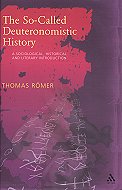|
The So-called Deuteronomistic History: A Sociological, Historical and Literary Introduction
|
|
George J. Brooke
|

|

From the Introduction
In the Hebrew Bible, the book of Deuteronomy is the last book of the Torah, the Pentateuch, which closes with the death of Moses (Deut. 34). This story is indeed a fitting end for the first part of the Hebrew Bible, since the Pentateuch can be understood as a 'biography of Moses', the books from Exodus to Deuteronomy covering his life from his birth (Exod. 2) to his death… But Deuteronomy is not only a statement that brings the former stories and law collections to an end. Deuteronomy is also an opening for the following 'historical' books Joshua, Judges, Samuel and Kings, which form in the Hebrew Bible the first part of the Prophets (the 'Former Prophets') .Even reading these books in an English translation, one easily recognizes therein the same style and vocabulary as is the book of Deuteronomy. But there are also other connections between the last book of the Pentateuch and the Former Prophets. In Deuteronomy Moses constantly alludes to the crossing of the Jordan and the coming conquest of the land … These events are related in the book of Joshua who is introduced as Moses; successor in Deut. 31. Because of these strong links between Deuteronomy and Joshua, scholars were often tempted to replace the Pentateuch by a Hexateuch, which would include the book of Joshua as the appropriate ending of a plot…But Deuteronomy does not only prepare the reader for the conquest stories of Joshua, it alludes also to the following books…
The close relations in style, vocabulary and content that links together the books of Deuteronomy, Joshua, Judges, Samuel and Kings has led to the idea that these books are constituted a 'Deuteronomistic History', and every student of the Hebrew Bible or the history of Palestine in the first millennium BCE will be confronted from the very beginning of his or her studies by this enigmatic expression. Before presenting this thesis it will be useful to shed a glance on the content of the books which compose the so-called Deuteronomistic History.
|
|
